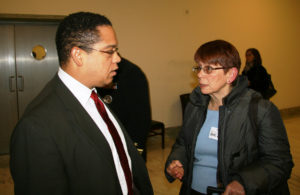By ERIN ELLIOTT /Â Community News Editor
On Wednesday, Feb. 4, United Jewish Communities (UJC), the umbrella organization of the Jewish federations in North America, hosted about 50 Jewish leaders in Washington, D.C., who spent the day lobbying members of Congress to support increased Medicaid funding to states.
Those who took part in the mission were primarily from the East Coast, but three people traveled from Minnesota to encourage support for the issue that affects many individuals, families and organizations in the Twin Cities community.
Local leaders who traveled to Washington were Ethan Roberts, director of the Twin Cities Jewish Community Government Affairs Program at the Jewish Community Relations Council of Minnesota and the Dakotas (JCRC); Mari Forbush, chief operating officer at Jewish Family and Children’s Service of Minneapolis; and Allan Baumgarten, a past public policy chairman of UJC and honorary co-chair of the Feb. 4 mission.

“There were various parts of the stimulus package which of are interest to the UJC, but the part that was most of interest to both the UJC and to the Jewish community of Minnesota is the component dealing with Medicaid,” Roberts told the AJW.
Medicaid is a program that assists low-income families and seniors with health care costs, and is the single largest source of federal funding to Minnesota. Medicaid funding supports Sholom Community Alliance’s nursing homes, and home-based care programs from JFCS and Jewish Family Service of St. Paul (JFS), among others.
In Washington, Roberts, Forbush and Baumgarten personally met with Reps. Keith Ellison and Eric Paulsen. They also met with staffers who work with Reps. Collin Peterson and Betty McCollum, and Sen. Amy Klobuchar.
At a lunch at the Capitol’s new visitors center, the group heard from Sens. Arlen Specter and Debbie Wasserman-Schultz, among others.
According to Roberts, both the House and Senate version of the stimulus package included $87 billion dollars to states to fund Medicaid over two years. The bill could provide Minnesota with between $1.7 and $2 billion to fund the program.
With a state deficit at $4.8 billion right now, Roberts is concerned that funding for health and human services will be the first to be cut. He also noted that many of the programs that are run by Jewish agencies serve a large number of non-Jews.
“The intention here is to use federal monies to diminish or even cancel out the cuts that may have to be made on the state level,” Roberts said. “The Jewish community is disproportionately aged — we have a higher percentage of seniors than other faith-based communities — and we have a lot of institutions throughout the country that take care of our seniors. UJC knows this…and they are at the forefront in Washington on this issue.”
Baumgarten, whom Roberts called an “expert” on healthcare policy, has worked in human services with UJC for 10 years. He said bringing in people from the local communities was effective in influencing their representatives in Congress.
“We did deliver the message that these appropriations within the stimulus package were important and were very much worthy of support,” Baumgarten said. “I’ve done these kinds of meetings in Washington several times in the last five to 10 years and a lot of the message, particularly in meeting with the staff people, is that you can be a resource for them. They need information; they’re trying to make an argument to their colleagues about why something is important… That’s very helpful to them.”
On Tuesday, the stimulus package passed the Senate by a vote of 61 to 37, with three Republicans joining 56 Democrats and two independents in favor, according to the New York Times.



















